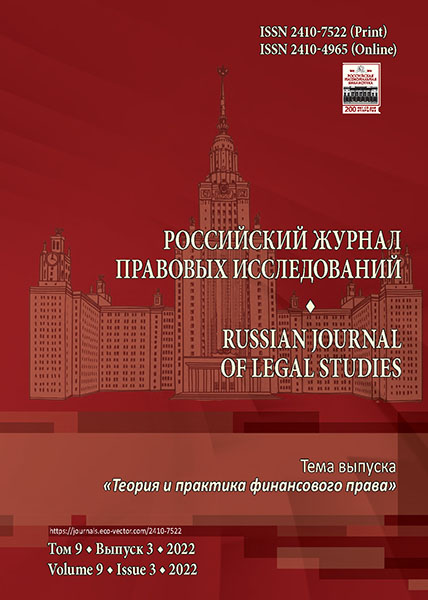Проблемы правового регулирования финансовых услуг в контексте брекзита
- Авторы: Галушко Д.В.1
-
Учреждения:
- Финансовый университет при Правительстве Российской Федерации
- Выпуск: Том 9, № 3 (2022)
- Страницы: 31-38
- Раздел: Международно-правовые науки
- Статья получена: 27.08.2022
- Статья одобрена: 29.08.2022
- Статья опубликована: 25.10.2022
- URL: https://journals.eco-vector.com/2410-7522/article/view/110387
- DOI: https://doi.org/10.17816/RJLS110387
- ID: 110387
Цитировать
Полный текст
Аннотация
В статье рассматриваются основные проблемы, возникшие в результате брекзита в Великобритании, для сферы финансовых услуг, занимающей одно из наиболее важных мест в структуре экономики данного государства. Заключенное после брекзита Соглашение о торговле и сотрудничестве между Европейским союзом и Великобританией не содержит специальных норм в отношении финансовых услуг и тем самым добавляет риски финансовой стабильности сторон, а имеющиеся международные акты «мягкого права» не восполняют имеющийся пробел. Как следствие этого, доступ британских финансовых услуг на общий рынок Европейского союза возможен только на основании признания «эквивалентности» британского регуляторного режима Союзному. При этом такое решение до сих пор не принято и вряд ли будет принято в ближайшей перспективе. «Эквивалентность» способствует конвергенции двух правопорядков, обеспечивая снижение неопределенности в регулировании финансовых услуг. Автором статьи делается вывод, что в контексте целей выхода Великобритании из Европейского союза, намерений британского правительства по возврату регуляторных полномочий, отсутствие четкого международно-правового механизма сотрудничества между Великобританией и Европейским союзом в сфере регулирования финансовых услуг будет способствовать все большей дивергенции в правовом регулировании в правопорядках обеих сторон, что также может увеличить барьеры для трансграничной торговли финансовыми услугами. Методологической основой работы стали известные общие и частные методы научного исследования. Целью и задачами статьи являются исследование соответствующих проблем правового регулирования финансовых услуг в контексте выхода Великобритании из Европейского союза, выявление общих тенденций, а также сущностных характеристик и основных черт в рассматриваемой сфере.
Ключевые слова
Полный текст
Об авторах
Дмитрий Вячеславович Галушко
Финансовый университет при Правительстве Российской Федерации
Автор, ответственный за переписку.
Email: galushkodv@gmail.com
ORCID iD: 0000-0002-9301-9565
SPIN-код: 1710-5918
Scopus Author ID: 57219358969
ResearcherId: GLT-7304-2022
доцент, кандидат юридических наук
Россия, МоскваСписок литературы
- Британия после брекзита: Монография / Е.В. Ананьева, Л.О. Бабынина, Д.В. Галушко и др. М.: Ин-т Европы РАН, 2021. 183 c. doi: 10.15211/report82021_386.
- Экономические аспекты брекзита / Отв. ред. А.И. Бажан и др. М.: Ин-т Европы РАН, 2017. 102 с.
- Долгова А.Ю. Лондон как международный финансовый центр: статус и перспективы с учетом процесса Brexit // Финансовый бизнес. 2017. № 3(188). С. 53–59.
- Галушко Д.В. Развитие концепции суверенитета государств в условиях членства в международных организациях // Северо-Кавказский юридический вестник. 2020. № 1. С. 39–44. doi: 10.22394/2074-7306-2020-1-1-39-44.
- The Law & Politics of Brexit. Volume III: The Framework of New EU-UK Relations / Ed. by F. Fabbrini. Oxford: Oxford University Press, 2021. 336 p.
- Howell E. Brexit, Covid-19, and Possible Frameworks for Future UK/EU Financial Governance Cooperation // Modern Law Review. 2021. Nov; 84(6). P. 1227–1256. doi: 10.1111/1468-2230.12650.
- Галушко Д.В. Взаимодействие права Европейского союза с правом государств-членов и третьих стран. Воронеж: Воронежский государственный университет, 2018. 186 с.
Дополнительные файлы








